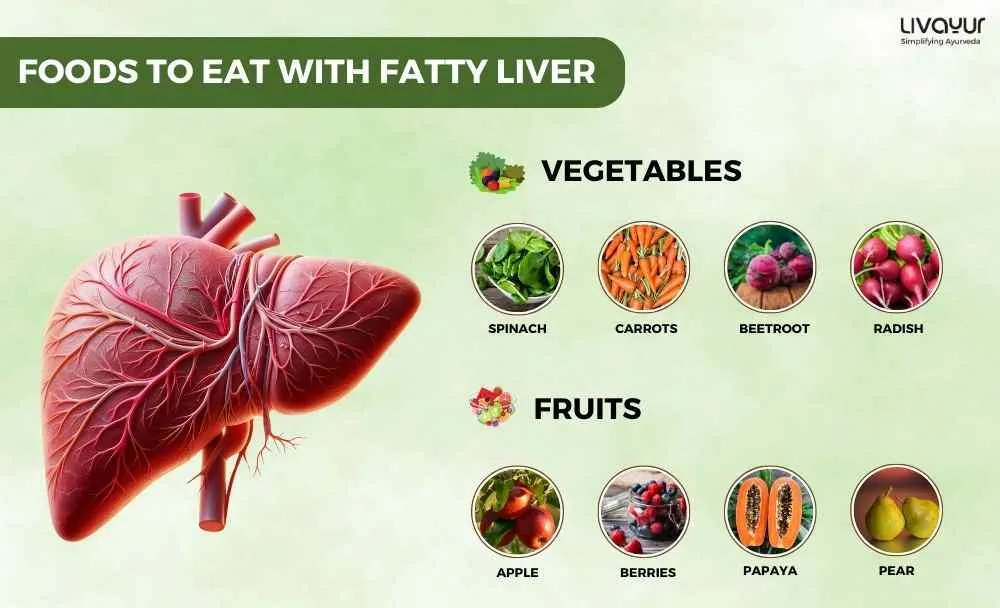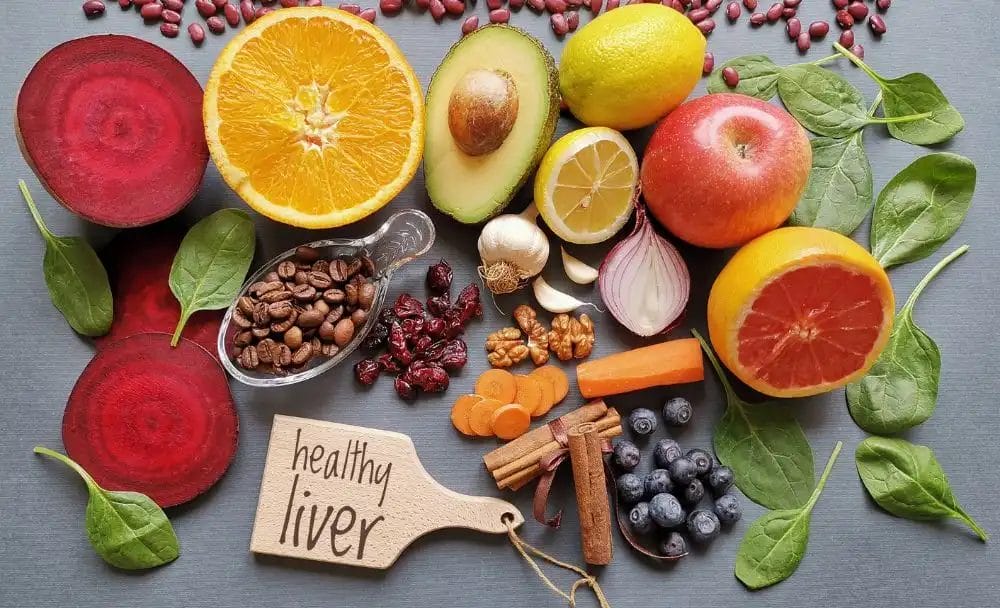This article is reviewed by an expert

Fatty liver, also known as hepatic steatosis or Yakrit Roga in Ayurveda, is a prevalent condition characterized by the accumulation of excess fat in the liver cells [1]. It can lead to liver inflammation, impaired liver function, and, if left untreated, progress to more severe conditions. Ayurveda, the ancient Indian system of medicine, offers valuable insights into managing fatty liver through a holistic approach that emphasizes diet, lifestyle, and herbal remedies [1]. This article aims to provide a comprehensive guide to an Ayurvedic fatty liver diet, including food choices, avoidance of certain foods, and practical tips to support liver health.
Understanding Fatty Liver
Fatty liver can be caused by factors such as obesity, insulin resistance, unhealthy dietary habits, excessive alcohol consumption, and certain medications. In Ayurveda, it is believed to be primarily caused by an imbalance in the Pitta dosha and impaired Agni (digestive fire). Ayurvedic treatment focuses on restoring the balance of doshas and enhancing liver function through dietary modifications and lifestyle changes [1].
Ayurvedic Principles for Fatty Liver Diet [2]

- Favor Pitta-Pacifying Foods: Include cooling and soothing foods to pacify the aggravated Pitta dosha. Opt for fresh fruits like apples, pears, and papaya, and incorporate vegetables such as bitter gourd, spinach, and carrots. These foods help balance Pitta and support liver health.
- Emphasize Digestive Health: Agni (digestive fire) plays a crucial role in Ayurveda. Consume easily digestible foods like cooked vegetables, soups, and light meals. Avoid heavy, fried, and processed foods that can burden the liver and aggravate Pitta.
- Reduce Pitta-Aggravating Foods: Minimize or avoid spicy, oily, and acidic foods as they can further aggravate Pitta and contribute to liver inflammation. This includes hot spices, fried foods, alcohol, caffeine, and carbonated beverages.
- Opt for Healthy Fats: Incorporate nourishing fats such as ghee, coconut oil, and olive oil in moderation. These healthy fats provide essential nutrients and support liver health without overburdening the liver.
- Herbal Support: Ayurveda recommends specific herbs with liver-protective properties. Turmeric, milk thistle, dandelion root, and kutki are commonly used to support liver function and reduce inflammation. Consult an Ayurvedic practitioner for personalized herbal recommendations based on your individual needs.
Foods to Eat for Fatty Liver [3,4]
- Fresh Fruits: Apples, pears, papaya, and berries.
- Vegetables: Bitter gourd, spinach, carrots, beets, and radishes.
- Whole Grains: Quinoa, brown rice, oats, and barley.
- Legumes: Lentils, mung beans, and chickpeas.
- Nuts and Seeds: Almonds, walnuts, flaxseeds, and chia seeds.
- Herbal Teas and Infusions: Dandelion tea, mint tea, and coriander-infused water for liver detoxification and support.
Foods to Avoid for Fatty Liver [2]
When it comes to managing fatty liver, understanding the foods to avoid is just as important as knowing what to include in your diet. Making smart dietary choices and avoiding certain foods can significantly support liver health and prevent further damage. In this section, we will explore the foods that should be avoided for fatty liver, as they can worsen inflammation, contribute to fat accumulation, and hinder the liver’s ability to function optimally. By being mindful of these dietary factors, you can take proactive steps towards improving your liver health and overall well-being.
- Processed and packaged foods: High in trans fats, refined sugars, and artificial additives.
- Red meat and fatty meats: Opt for lean protein sources like fish and poultry.
- Deep-fried and greasy foods: Choose healthier cooking methods like baking or steaming.
- Alcohol and sugary beverages: Alcohol can further damage the liver, and sugary drinks contribute to fatty liver.
- Excessive salt intake: Limit your salt consumption to maintain overall health.
- Avoid processed and refined carbohydrates: Opt for whole grains instead.
Conclusion
In conclusion, adopting an Ayurvedic fatty liver diet can play a crucial role in managing and preventing the progression of fatty liver. By prioritizing the balance of Pitta dosha and supporting Agni, individuals can make wholesome food choices that nourish the liver and promote overall health [5]. Consulting an Ayurvedic practitioner is recommended for personalized guidance tailored to individual needs. Additionally, incorporating Ayurvedic lifestyle practices such as regular exercise, stress management, and adequate sleep can further support liver health. Remember that managing fatty liver requires commitment and consistency, and working closely with an Ayurvedic practitioner ensures ongoing guidance and adjustments to the treatment plan as needed. By embracing the holistic approach of Ayurveda, individuals can take proactive steps to improve their quality of life and promote long-term liver health.
Frequently Asked Questions [1] [2] [4]
- Can an Ayurvedic fatty liver diet cure fatty liver completely?
While an Ayurvedic fatty liver diet can support liver health, a complete cure depends on various factors and individualized treatment. It is recommended to consult an Ayurvedic practitioner for a comprehensive approach.
- Are there any specific Ayurvedic herbs that can help with fatty liver?
Yes, Ayurveda suggests herbs like turmeric, milk thistle, dandelion root, and kutki for their liver-protective properties. However, the choice of herbs should be personalized based on individual needs.
- Can I consume dairy products in an Ayurvedic fatty liver diet?
In moderation, dairy products like ghee and milk can be included. However, it is important to choose low-fat options and listen to your body’s response.
- How long does it take to see improvements in fatty liver with an Ayurvedic diet?
The timeline for improvement varies for each individual, depending on the severity of the condition and adherence to the diet and lifestyle recommendations. Consistency and patience are key.
- Is exercise important for managing fatty liver?
Yes, regular physical activity is beneficial for managing fatty liver. It supports metabolism, weight management, and overall liver health. Consult your healthcare provider for suitable exercises based on your health condition.
Disclaimer: The information provided here is for general information and not meant to substitute any medical advice. Please consult your doctor for appropriate medical consultation.
References:
- https://www.worldwidejournals.com/global-journal-for-research-analysis-GJRA/recent_issues_pdf/2020/October/ancient-notion-on-yakrit-vikara-liver-disorders-in-ayurveda_October_2020_7010662482_5901480.pdf
- https://www.ncbi.nlm.nih.gov/pmc/articles/PMC9307675/
- https://pubmed.ncbi.nlm.nih.gov/19619118/
- https://www.ncbi.nlm.nih.gov/pmc/articles/PMC8194756/
- https://rgesociety-ron.org/amch/wp-content/uploads/2021/09/JAIMS-MY-ARTICLE.pdf
















